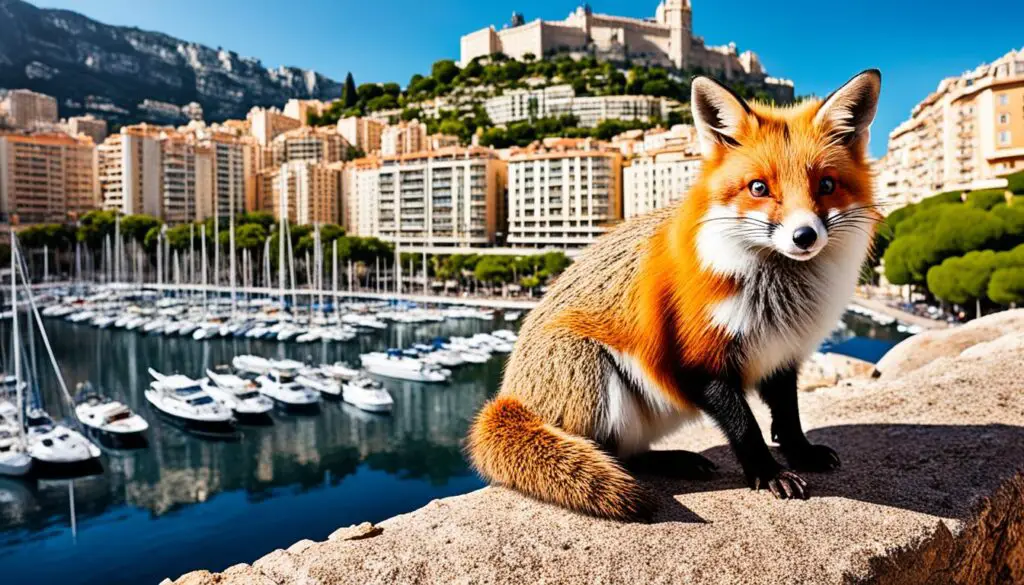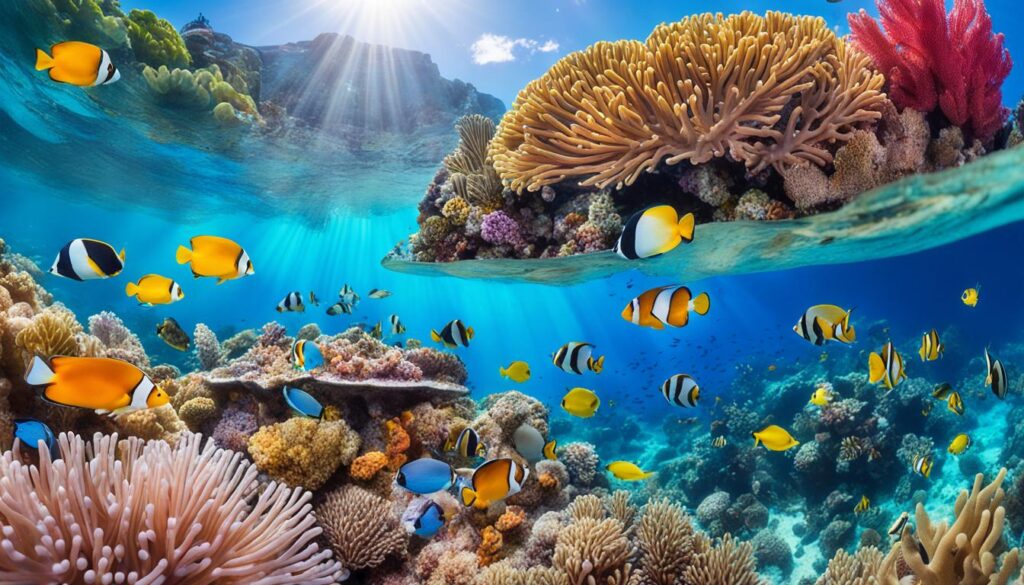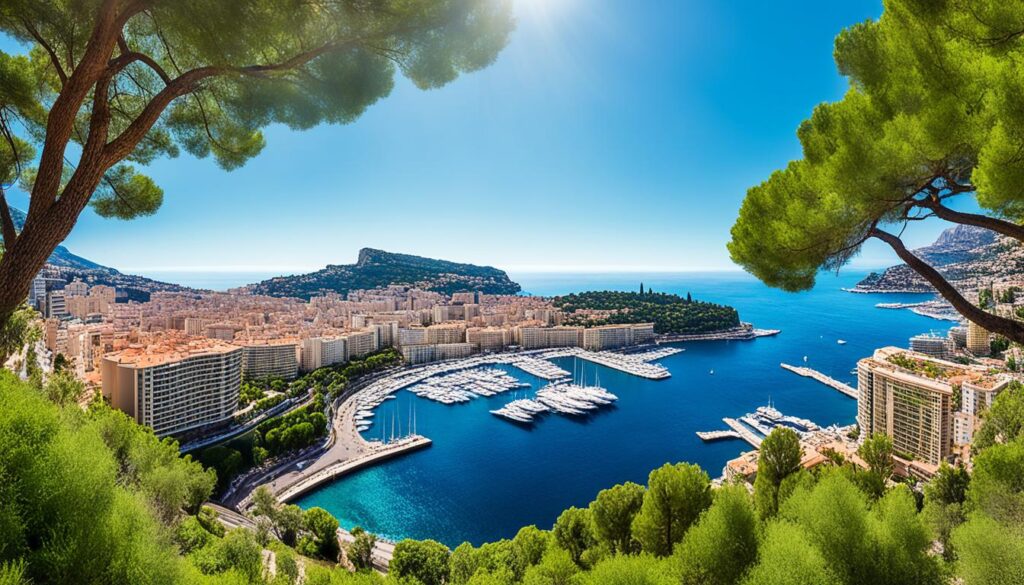Did you know that despite its small size, Monaco is home to a surprising array of wildlife? While commonly associated with luxury and high society, this glamorous principality also serves as a sanctuary for diverse animal species. From land mammals to marine life, Monaco’s commitment to wildlife conservation and the preservation of endangered species is truly remarkable.

Key Takeaways:
- Monaco may be small, but it provides a haven for diverse wildlife.
- The principality is home to ten mammal species, some of which are native, while others have been introduced or reside in captivity.
- Monaco’s coastal waters are rich in marine life, including dolphins, whales, and sharks.
- The Pelagos Sanctuary, a marine protected area governed by Monaco, Italy, and France, contributes to the conservation of marine mammals.
- Monaco has established wildlife sanctuaries, such as the Zoological Gardens and Marineland, to educate visitors and protect various animal species.
Mammal Species in Monaco
Monaco is host to ten mammal species, none of which are currently threatened. These species include rodents, hedgehogs, shrews, whales, and carnivorans. While some of these species are found naturally in Monaco, others have been introduced or reside in captivity. The conservation status of these mammals varies, with some being least concerned and others facing high risks of extinction. Monaco places importance on the protection and preservation of its mammal species.
Mammal Species in Monaco:
| Mammal Species | Conservation Status |
|---|---|
| Rodents | Least Concern |
| Hedgehogs | Least Concern |
| Shrews | Least Concern |
| Whales | Least Concern |
| Carnivorans | Varies: Least Concern to Endangered |
Monaco’s commitment to mammal conservation is evident in its efforts to safeguard these species and their habitats. By prioritizing the protection of its mammal populations, Monaco contributes to the overall preservation of biodiversity and the delicate balance of its ecosystem.
Marine Life in Monaco
As a coastal country, Monaco is blessed with a vibrant and diverse marine ecosystem. The pristine waters surrounding Monaco are teeming with an abundance of marine life, making it a captivating destination for nature enthusiasts and marine biologists alike.
The Monaco marine biodiversity is truly remarkable, showcasing a wide array of species ranging from dolphins and whales to sharks and colorful marine fish. These waters provide a vital habitat for numerous marine organisms, contributing to the overall health of the Mediterranean Sea.
One significant marine conservation effort in Monaco is the establishment of the Pelagos Sanctuary. Governed by Monaco, Italy, and France, this marine protected area spans approximately 87,500 square kilometers, encompassing the waters of these three countries. The primary goal of the Pelagos Sanctuary is to safeguard the marine mammals and their habitats, ensuring their long-term survival.
| Marine Species | Common Name | Conservation Status |
|---|---|---|
| Delphinus delphis | Short-beaked Common Dolphin | Least Concern |
| Tursiops truncatus | Bottlenose Dolphin | Vulnerable |
| Balaenoptera physalus | Fin Whale | Endangered |
| Carcharodon carcharias | Great White Shark | Vulnerable |
The conservation efforts in Monaco not only focus on protecting individual species but also on preserving the delicate balance of the entire marine ecosystem. Through research, monitoring, and public awareness initiatives, Monaco is actively involved in marine conservation to ensure the long-term sustainability of its marine biodiversity.

The Pelagos Sanctuary
The Pelagos Sanctuary is not only a vital conservation area but also serves as a research hub for marine scientists. It provides an invaluable opportunity to study the behavior and migration patterns of marine mammals, contributing to our understanding of their ecological roles and the effects of human activities on their populations.
Furthermore, the Pelagos Sanctuary plays a crucial role in promoting sustainable tourism and responsible boat practices. By raising awareness about the importance of marine conservation, Monaco aims to foster a culture of respect and appreciation for the marine environment among locals and visitors alike.
In conclusion, Monaco’s commitment to marine conservation is evident through its efforts to protect and preserve the diverse marine life within its waters. By establishing the Pelagos Sanctuary and implementing various conservation measures, Monaco is playing a crucial role in safeguarding marine biodiversity and ensuring a sustainable future for its marine ecosystems.
Wildlife Conservation Efforts in Monaco
Monaco is committed to wildlife conservation and has implemented numerous initiatives to protect its biodiversity. The country recognizes the importance of preserving its unique fauna and flora, and has taken significant steps towards environmental protection and wildlife preservation.
One of Monaco’s notable conservation efforts is the establishment of wildlife sanctuaries, such as the Zoological Gardens and Marineland. These sanctuaries provide a safe haven for various animal species and allow visitors to observe and learn about Monaco’s diverse wildlife firsthand. The Zoological Gardens, in particular, focuses on education and raising awareness about environmental issues, making it an important hub for wildlife conservation.
In addition to the sanctuaries, Monaco actively supports national and international projects dedicated to environmental protection and the preservation of endangered species. The country collaborates with organizations and governments worldwide to ensure the sustainability and long-term survival of vulnerable ecosystems.
The principality’s commitment to wildlife conservation extends beyond its borders. Monaco actively participates in international forums and conferences to share knowledge, exchange best practices, and contribute to global efforts in protecting biodiversity.
Through these initiatives, Monaco strives to maintain a sustainable and thriving ecosystem, promoting the coexistence of humans and wildlife. By investing in wildlife conservation, Monaco sets an example for other countries in preserving natural habitats and safeguarding endangered species.

| Conservation Initiatives in Monaco | Impact |
|---|---|
| Establishment of wildlife sanctuaries | Provides a safe habitat for various animal species and educates visitors about wildlife preservation. |
| Support for national and international projects | Contributes to environmental protection and helps preserve endangered species globally. |
| Active participation in global forums and conferences | Shares knowledge, best practices, and collaborates with other nations for sustainable biodiversity conservation. |
Conclusion
In conclusion, Monaco’s commitment to biodiversity and environmental conservation is apparent in its efforts to protect and preserve its wildlife. Despite its reputation as a luxurious destination, Monaco is also a home to a diverse array of wildlife. From land mammals to marine life, the principality provides an urban sanctuary for various species.
Monaco’s wildlife sanctuaries, such as the Zoological Gardens and Marineland, offer visitors and locals the opportunity to observe and learn about different animal species while supporting conservation efforts. These sanctuaries play a crucial role in raising awareness about the importance of wildlife preservation.
Furthermore, Monaco’s dedication to biodiversity extends beyond its designated wildlife areas. Even in its urban areas, the principality takes measures to create habitats that support local fauna. Monaco’s commitment to balancing its lavish lifestyle with environmental consciousness sets an example for sustainable living.
By visiting Monaco’s wildlife sanctuaries and engaging in conservation initiatives, individuals can contribute to the preservation of the principality’s natural beauty and unique wildlife. Together, we can ensure that Monaco remains a sanctuary for diverse species and continues to prioritize wildlife conservation.
